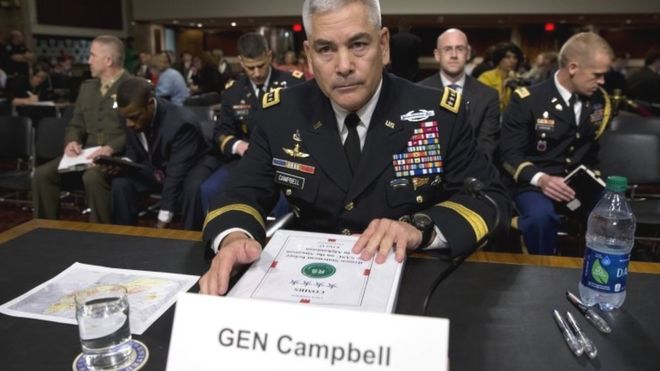 |
| General Cambell addressing the Senate Armed Services Committee |
Previously, the U.S. had been reluctant to use air power to assist the anti-Taliban efforts as it is very easy to inadvertently hurt civilians. However, that did stop the U.S. from going through with the attack on October 3.
Even though it was the only free trauma care hospital in northern Afghanistan, Doctors Without Borders decided to withdraw from Kunduz as they no longer see it as safe. Doctors Without Borders, claims that these actions amount to a war crime. The president of Doctors Without Borders insists that the attack is not "an inevitable consequence of war" and needs a thorough, independent investigation.
Although it is unclear how the request made it though the chain of command and if the U.S. even knew they were attacking a hospital, it still completely unacceptable to attack hospitals, especially when run by peaceful, international organizations like Doctors Without Borders. I think that there definitely needs to be an independent investigation so an unbiased analysis of the situation can determine to what degree of responsibility the US has for the airstrike. Nothing the U.S. can do will make up for the loss of 22 innocent civilians, 12 of whom were volunteers. However, the U.S. needs to make an effort to change wartime procedures so nothing like this can happen again.
What do you think about the airstrike? Do you think that the United States actions should be considered war crimes? To what extent does the U.S. need to answer for its mistake?
Sources:
5 comments:
I look at the flawed targeting of the hospital as a sign of desensitization to this mode of war that has come with its increasing prevalence in US military strategy. Airstrikes are innately detached form of military action anyway, developing a familiarity with the medium that ultimately leads to laziness and an aversion to checks on the process that might have prevented such and atrocity. This was avoidable, and the US military should bog down the process of this decision making to ensure that such blatant miscalculations do not occur, or at least occur less often. This action should be considered a war crime, as this would spur improvement in the US military and send a strong message that such results are unacceptable. Now, it is important to note that this mode of warfare is the cleanest that has yet existed and has the potential to save more than it kills, so airstrikes should be preserved, just monitored and regulated.
I think that the U.S. definitely needs to be more clear about how this air strike happened because it raises a lot of suspicion when they have changed the story of what happened many times. For example, at first the Pentagon said that the strike was "against insurgents who were directly firing upon US service members," but they later reported that it was actually Afghan forces who were being fired against, and these Afghan forces called upon the US for support. This raises questions about how this decision to make the air strike was made and who made it. I think that we do not know enough yet to call it a war crime, but even if it was just a mistake, the US should still answer for it, especially because 22 civilians were killed in a hospital belonging to an impartial organization.
http://www.bbc.com/news/world-asia-34458270
I think an interesting question to consider is who would be charged with these crimes. Obviously, with something this horrendous, someone should be held accountable. But should it be the person who conducted the air strike, the person who called it in, the person who covered it up, or someone else entirely? I think it is unlikely that anyone will be held responsible in the end because it is so difficult where the blame should land. I think the best way to move away from this event is for the government to look at how this airstrike fell through the process and was approved despite the inappropriate target.
In response to Langston's comment, I think that a problem with bogging down the process of airstrikes is that it could prevent swift action when swift action could save lives. I agree that bombing the hospital is a tragic mistake and someone should be held accountable, but I don't agree that slowing the process is the best solution, nor a solution that will be readily adopted by the military. Instead of creating more check marks in the system of calling for an airstrike, I think it would be better to make the existing checks/initial call more explicit about who is calling for an airstrike, what the target is, and why.
I agree with Louis’s comment that the best way to move away from this event is for the government to look at how this airstrike fell through the process. It’s the same way the government dealt with 9/11, in which they examined what went wrong and created preventative standards to avoid a similar event. With such a dramatic event like this, I am sure there is some standard that they can either implement or crack down on so it doesn’t happen again, especially if they got the information from someone on the ground.
Post a Comment